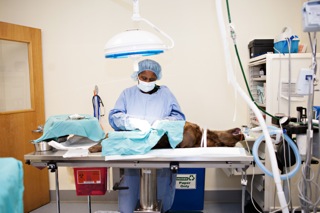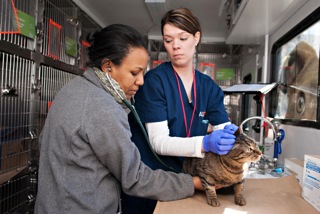I love my husband. I really do. He's my rock, my sail, my best in show.
But yesterday when our lizard was ill, he fell short of perfection. It all started when our kids' cries shattered the morning silence. "Blood! There is blood in Rocket's cage!" I called out to Roman for support -- silence. I smelled rubber burning; apparently he was late for a meeting.
When I phoned him to discuss medical intervention he stopped me mid-sentence. "Wait. What? It will cost $500? Are you out of your mind? We can get him a nice casket for $50."
In Roman's defense, he is a mammal lover. If you include the kids, we have an even dozen roaming around in basic harmony. Dogs, cats, and bunnies all enjoy freedom and routine health care.
The reptilian purchase was a reach for us, but we conceded to my youngest son's steadfast lobbying. We became a mammal house, plus one. Making our weekly trek to the local pet store we found our Rocket, a Bearded Dragon, the lizard most dog-like in personality, who was, at the point of purchase, about the size of a pencil. Buyers beware -- lizards grow. Over time Rocket's won me over. The kids and I have socialized him like a puppy and bought a collection of lizard harnesses, when the kids feel like walking something other than a dog.
Fast forward to the day of the incident. As I mentioned, Roman left. When I got to the terrarium I was shocked to see lizard blood on the basking rock, and nauseated when I beheld a globular protrusion extending from his nether-region. Oh please, I thought: Is there a grown-up in the house?
I quickly called the exotic veterinarian who couldn't see us until 3:30 p.m. I texted my herpetologist friend -- a self-taught reptile-frog-and snake guru. He suggested warm baths and an abdominal massage. Just what I had time for at 8:30 a.m. on a Monday morning... a lizard-spa.
Suffice it to say our lizard is fine. Three warm baths and as many belly rubs later, his protrusion contracted. By suppertime he was back on my son's knee enjoying a freshly caught stink-bug salad.
But this whole development has given me pause to consider. Our family has never discussed our pets' medical budget before. We'd actually never given it any thought.
In my profession, clients routinely come to me to discuss the costs of certain medical procedures, from routine neutering to the advanced treatments now available to pets with cancer or other illnesses.

(Geoffrey Tischman Photography at ASPCA)
"What would you do," my clients implore, "if your 13-old-dog was given months to live, unless drastic measures were taken?" The decision is a very personal one.
What's more difficult for me are the stories of financial stress and forced abandonment -- both for the dislocated pets and the people who love them. Keeping up with a pet's physical and medical needs can be costly: a yearly price tag can range between $270 and $1,200 dollars depending on the size and type of the pet and the location. Emergencies carry their own price tag, often in the range of a thousand dollars or more. These numbers exclude the pharmaceutical wave that has hit the pet industry. Medications can cure many ailments, from anxiety-based disorders to internal dysfunction, but that cost can also add up.
There is nothing sadder than an older pet who has been abandoned because his family could not afford to care for him. Some criticize those who relinquish their pets to a shelter without giving any thought to the circumstances that may have led to the decision. Many people have become financially destitute, unable to care for themselves let alone their pet. The elderly are another demographic that is often forced to surrender the pets they love.
I think back to my favorite childhood story -- Lassie Come Home by Eric Knight -- and how torn the family was when they could no longer afford the dog's care. I still cry to think how Joe, the boy, longed for his dog, and how Lassie simply wanted to go home. It is a story that plays too often in American lives. Not all shelter dogs/cats long for a better life; they simply want to go home.
So our lizard has brought forth a valuable lesson and one that opens other doors of financial consideration. Families need to have an open discussion, both with each other and with their veterinarians. There are many measures that can be taken to manage medical costs. Pet insurance is a consideration I will explore in a future blog. A healthy diet, safe environment and basic training have all been shown to reduce stress induced illness as well as accidents.
If this blog leaves you with financial concerns about your pet's care, explore your options now while your pet is healthy. Speak to a local humane society to see if there is help available. Talk with your veterinarian about payment options should an accident occur or if you feel that even routine care would be a strain.

(Geoffrey Tischman Photography at ASPCA)
Pets cost money as does everything in life, but pet people are kind, and we all should recognize that times are difficult for many people. We certainly agree that there is no value, no price tag, on the love our pets inspire.
For more by Sarah Hodgson, click here.
For more on pet health, click here.